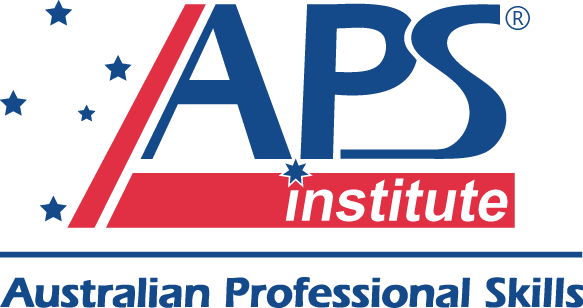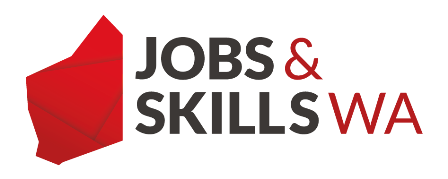
Certificate III in Commercial Cookery
IMPORTANT NOTE: This course is not suitable for persons unable to handle meat, seafood, poultry or dairy. We cannot guarantee that our kitchen facilities are free from potential allergens, including airborne particles of potential allergens. Accordingly, this course may not be suitable for people with severe allergies, including nuts allergies. Please note that all students must complete the units of competency required.
Course Description
Qualifying as a chef in Australia is now more flexible than ever. This one- year full time course provides students with broad cross section of theoretical knowledge and practical skills training in fully equipped commercial kitchens, ensuring graduating students are job ready for their career as a commercial chef.
Both International and Australian domestic students can enrol in this qualification. If you are an Australian permanent resident, you will be entitled to some government subsidy for part of the cost of this course under the Priority Industry Training Funding offered by the Department of Training and Workplace Development in Western Australia.
With this qualification, students will be able to work in a variety of venues where food is prepared and served. The course includes eight subjects designed to reflect the modern kitchen skill sets required of all chefs.
Course subjects include planning, organising, preparing and presenting food such as appetisers, stocks, meats, seafood and poultry, desserts and pastries, following health and safety procedures, maintaining kitchen premises, developing hospitality industry knowledge, developing cost effective menus and preparing food according to dietary and cultural needs.
Students are required to do hands-on practical training in Australian Professional Skills Institute’s fully operational commercial training kitchens. At the end of theory and practical training, all students are required to undertake compulsory workplace training throughout the course. Workplace training is an integral part of the training and assessment for this qualification. All students are required to work in an appropriate hospitality establishment such as restaurants, hotels, clubs, pubs, cafes, cafeterias and coffee shops as a trainee chef.
Career outcomes:
- Commis Chef
- Cook
- Assistant cook
Course Admission Requirements:
Australian Professional Skills Institute is CRICOS registered (CRICOS Provider Code 03255G).
Domestic Australian Students
- For Certificate level courses, students must have completed a minimum of Year 10 schooling or equivalent or to be a mature age student (20 years of age and above).
- Students need to demonstrate they have proficiency in English. If students cannot provide documented proof of their English language proficiency, they will be required to sit for a Language, Literacy and Numeracy test (LLN) before a place can be offered.
- Additional requirements below.
International Students
- Students need to demonstrate they have proficiency in English. For international students and English language requirements, please view the page for entry requirements here.
- For direct entry into an Advanced Diploma level course, students must have completed a diploma level qualification in Australia or equivalent.
- For Certificate level courses, students must have completed a minimum of Year 10 schooling or equivalent or to be a mature age student (20 years of age and above) with relevant work experience.
- Additional requirements below.
Additional Requirements
- All students must be willing to apply, or already hold, a current National Police Clearance (not older than 3 months at time of enrolment). This is COMPULSORY for students/candidates to undertake workplace training. A National Police Clearance can be acquired from any Post Office for a small fee. Please allow 3 weeks for delivery. Students cannot attend work experience without this.
- All learners are required to wear in accordance with Cookery Students Dress Code while attending workplace training.
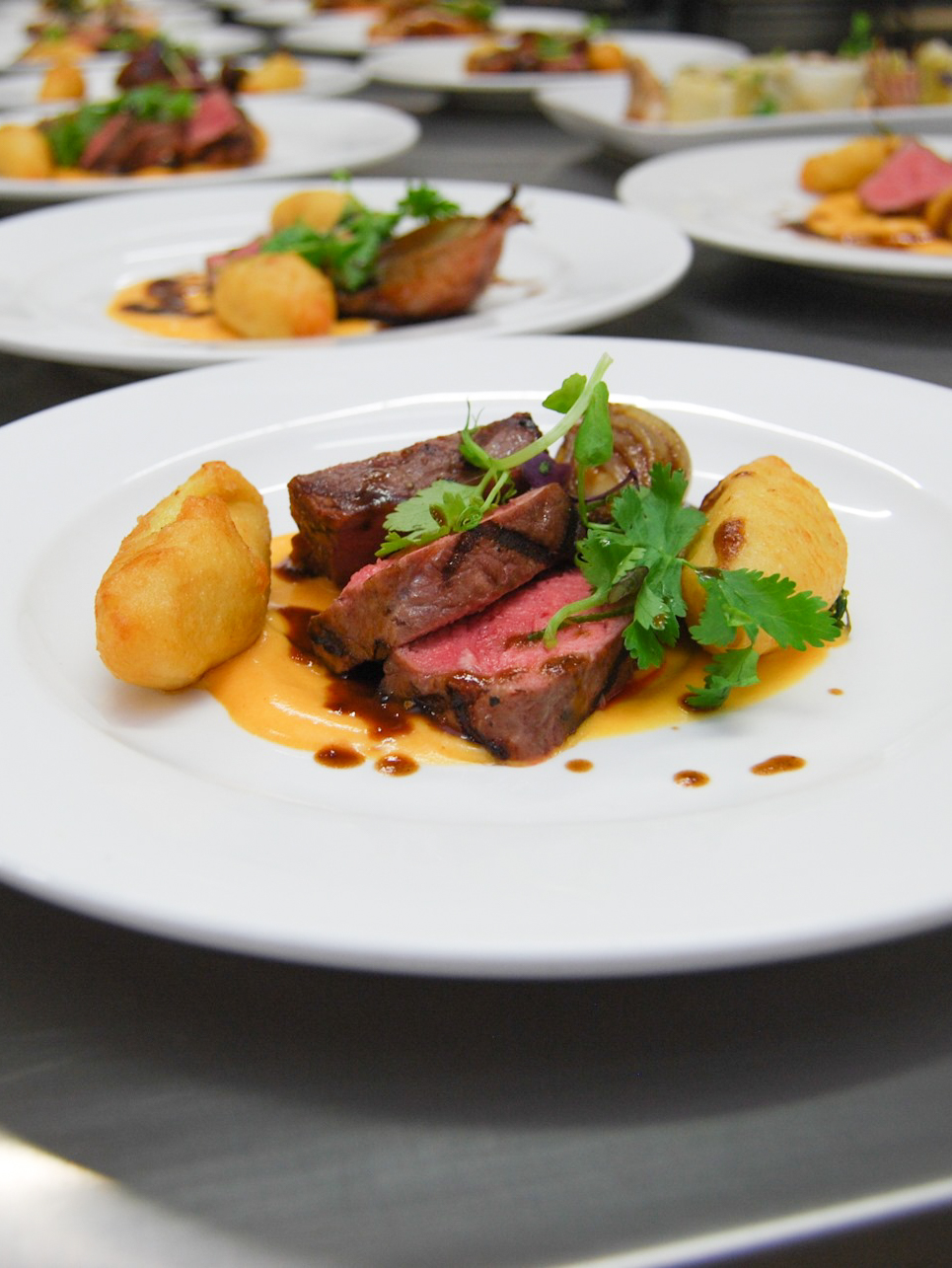
Kah Weng Lee’s Story (from Malaysia)
Unit Code |
Unit Name |
Core Units |
|
| SITXFSA005 | Use hygienic practices for food safety |
| SITXFSA006 | Participate in safe food handling practices |
| SITXWHS005 | Participate in safe work practices |
| SITHCCC023 | Use food preparation equipment |
| SITHCCC027 | Prepare dishes using basic methods of cookery |
| SITHCCC028 | Prepare appetisers and salads |
| SITXINV006 | Receive, store and maintain stock |
| SITHCCC043 | Work effectively as a cook |
| SITHKOP009 | Clean kitchen premises and equipment |
| SITXHRM007 | Coach others in job skills |
| SITHPAT016 | Produce desserts |
| SITHCCC041 | Produce cakes, pastries and breads |
| SITHCCC042 | Prepare food to meet special dietary requirements |
| SITHCCC029 | Prepare stocks, sauces and soups |
| SITHCCC035 | Prepare poultry dishes |
| SITHCCC036 | Prepare meat dishes |
| SITHCCC037 | Prepare seafood dishes |
| SITHCCC030 | Prepare vegetable, fruit, eggs and farinaceous dishes |
| SITHCCC031 | Prepare vegetarian and vegan dishes |
| SITHKOP010 | Plan and cost recipes |
Elective Units |
|
| SITHCCC038 | Produce and serve food for buffets |
| SITHCCC039 | Produce pates and terrines |
| SITHCCC044 | Prepare specialised food items |
| HLTAID011 | Provide First Aid |
| SITXINV007 | Purchase goods |
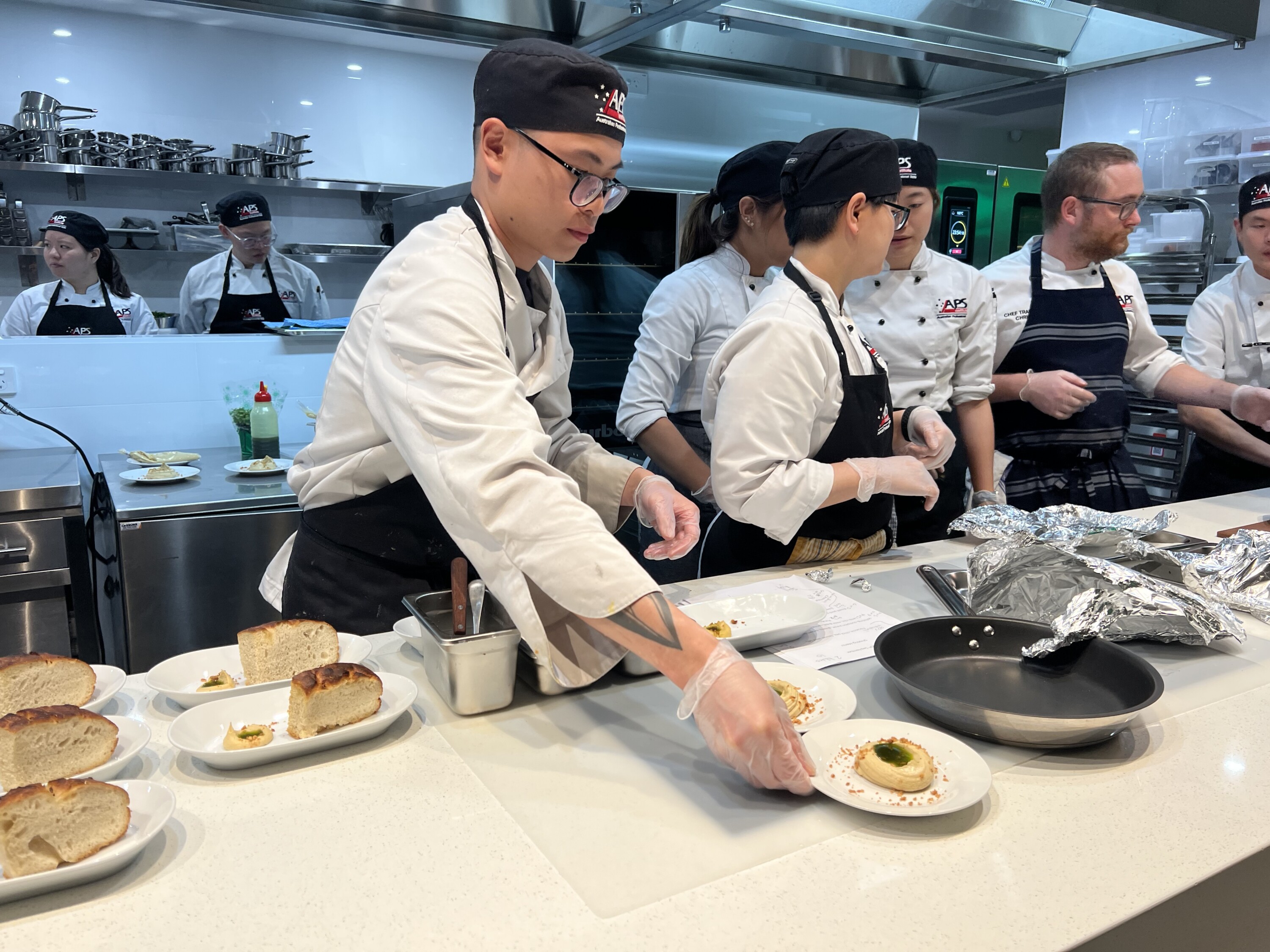
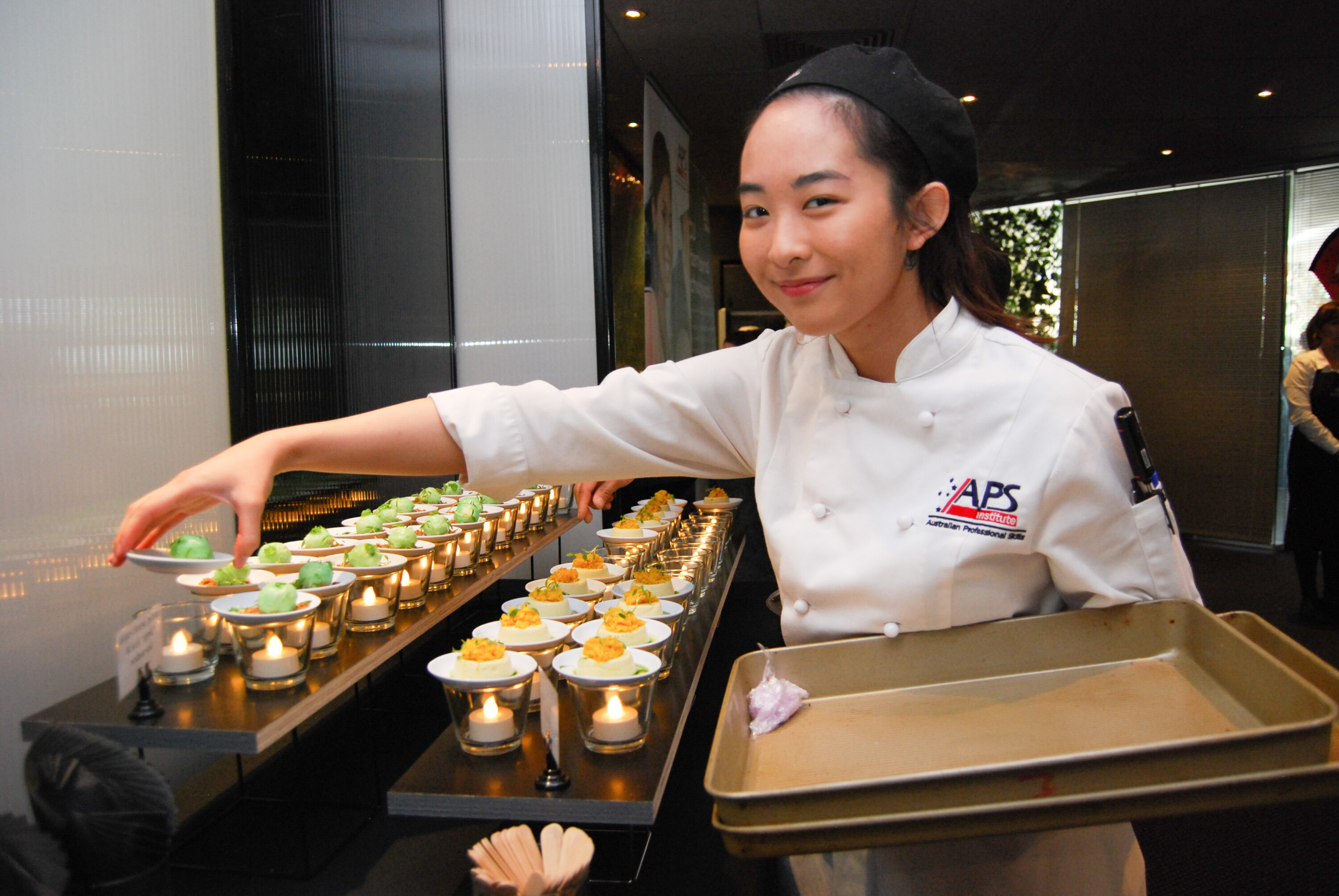
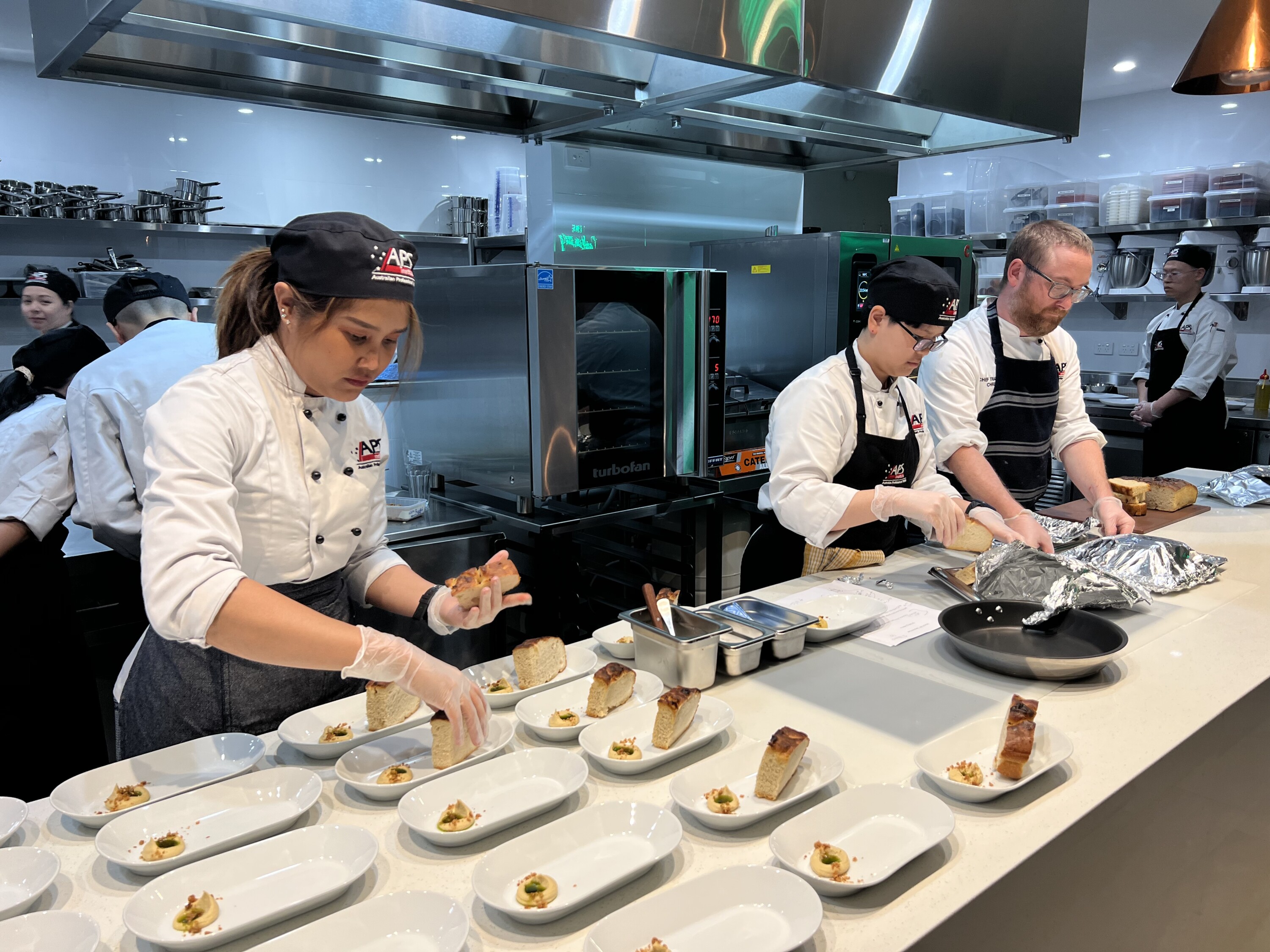
Resource Fees
- Full set of Chef’s uniform, shoes and knife kit / pastry kit
- Course materials – all course materials in electronic form or hard copies
- Food produce / materials used in practical kitchen for the full duration of the course
- Excursions /Expos / site visits
Mode of Delivery
Each day of delivery follows the same structure. The first 2 hours involves chef trainer lead and student focussed explanation, demonstrations, presentations, questions and answers, student practice. The second 2 hours involves the trainer and student undertaking their assessment tasks on premises (as a learning tool) utilising the specialised training facilities under the required supervision of the trainer.
All students are required to undertake industry work placements in a commercial kitchen after the fifth week of their first term. The industry work placement is usually one to two days per week and will continue until the end of the course. This industry work placement gives our students the opportunity to gain real work experience in a real-life professional kitchen, gain new ideas from top chefs and provides networking opportunities with industry professionals.
Career Outcome
- Chef
- Cook
- Assistant cook
Course Duration
Entry Requirements
- Minimum 18 years of age (for International students)
- Completion of high school or equivalent
- Have a passion to work in the kitchen or hospitality industry
- For international students and English language requirements, please view the page for entry requirements here.
- This course is not suitable for persons unable to handle meat, seafood, poultry or dairy products.
Timetable
Students need to attend face to face training at APSI campus and other training locations for a minimum of 20 hours per week.
Class hours (Practical Classes): Monday to Friday - between 7 am to 8 pm.
Class hours (Theory Classes): Monday to Friday - between 8:30 am to 5 pm.
Timetables/Delivery Schedules/Classes are subject to change without prior notice due to availability of training kitchens and teaching staff. Students will be given a timetable during orientation.
Assessment Methods
Assessment is based on the principles of competency based training. Performance of learners is assessed on their ability to perform the task(s) to industry standards. In order to ensure the principles of validity are upheld are variety of learning styles and a range of assessment strategies are used.
Assessment for each unit of competence will be through a combination of classroom based and work placement tasks. Classroom based assessment includes but is not limited to:
- Classroom exercises
- Assignments
- Practical demonstrations
- Group Activities
- Projects
- Verbal and/or written questions
Students are advised well in advance of assessment activities and a student may put forward for consideration any special needs they may have. The assessment criterion is documented in all modules, and workbooks. Dates of assessment are provided on the first day of class along with a timetable. Students may be assessed by a combination of continuous assessment and examinations. Continuous assessment may be based on competencies and marks, or a combination of both.
Uniform
All commercial cookery students are required to purchase one full set of chef’s uniform through APSI’s designed supplier. The chef’s uniform consists of chef’s jacket, trousers, apron, chef’s hat and protective footwear. All students must wear full set of chef’s uniform when they attend training in the commercial kitchen.
Students are also required to purchase one full set of knives for all practical classes.
Dress code while attending theory class at APSI campus
There is a dress code for all hospitality students. Students are required to wear a white shirt / blouse and black trousers or skirt while attending class. Flat black non-slip covered shoes must be worn at all times.
All learners are required to wear in accordance with Cookery Students Dress Code while attending workplace training.
Recognition of Prior Learning
Recognition of Prior Learning (RPL)
RPL is available to anyone who has experience working in a commercial kitchen.
RPL:
- provides an alternative pathway to achieving a qualification without course attendance
- is a consultative process between with the candidate and the assessor to determine whether the candidate has acquired the requisite learning, skills and knowledge to demonstrate that they have achieved the required learning outcomes or performance criteria of the course or qualification, for which the candidate is seeking
- identifies where appropriate additional learning experiences or training gaps are needed to achieve the course or qualification
- is the conduct of an assessment to confirm competency.
APSI has developed a process that promotes holistic and task-based assessment. It focuses on relating assessment activities to actual job tasks. The intention of this model is to streamline and simplify the process of recognising competency.
Prior to RPL, information is provided to the candidate on the assessment process. Specific advice is given to each candidate on how they can demonstrate their competence and what documentary evidence is required to support their application. Each industry has unique documents that can provide evidence of experience and competence.
The candidate is required to provide adequate information prior to, throughout and after a training and assessment experience. The assessor, in this process, needs to be fully aware of the needs of the candidate and help them identify relevant workplace personnel who can confirm the candidate’s competency.
The focus of the APSI streamlined holistic assessment process is to focus on demonstrated skills and knowledge and not to rely purely on documentary evidence as the main source of evidence.
Some examples of documentary evidence that can support the process include:
- licences such as First Aid, RSA
- CV or work history with details of job role and responsibilities
- previous qualifications from overseas and Australia
- certificates and records of results or assessments completed with other RTO’s
- photographs of work undertaken
- samples of related project work
- diaries of tasks performed
- task sheets/job sheets/logbooks
- site training records
- pay slips / employment contracts / job descriptions
- memberships of relevant professional associations
- references/letters/third party reports from previous employers/supervisors
- industry awards
- performance appraisals
Accreditation
Articulation
Employment Skills
(Source: AQF Implementation Handbook 2007)
Location of Delivery
East Perth main campus
Wellington Fair, 40 Lord Street, East Perth, WA 6004 Western Australia
Practical kitchens and industry work placement
Rendezvous Hotel Perth Scarborough
Address: 148 The Esplanade, Scarborough, WA 6019
Rendezvous Hotel Perth Central
Address: 24 Mount Street, Perth WA 6000
Website| rendezvoushotels.com
Industry Workplace Training
At the Workplace approved by your course coordinator
Disclaimer
The information contained on this website is current at the time of publishing. Australian Professional Skills Institute reserves the right to change the admission requirements, fees, location of delivery and units of competency whenever necessary. Please contact us for the most current information.
